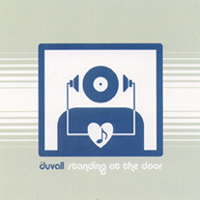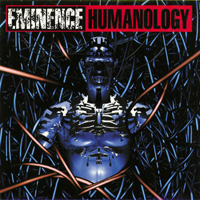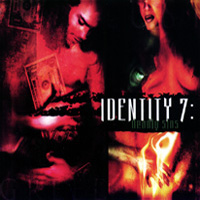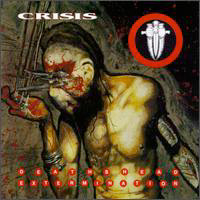 Crisis
Crisis
Deathshead Extermination (Metal Blade)
An interview with vocalist Karyn Crisis
by Scott Hefflon
Half-crazed with insight and isolation, the siren screams at the turgid sea of metal. The sea, brackish and stale, is as slow to respond as red hot lava. The chilling of the atmosphere has reduced the once fiery sludge to tepid, watered-down swill, striving vainly to maintain fluid motion. The siren sits upon a solid outcropping of rock, oblivious to the stench of decay about her, tormented more by the images within, than by the tell-tale signs of another Ice Age without. The rock will weather the harsh elements, and the siren will scream until her dying day. As is her nature.
The good ship Metal Blade hears the song and responds, scooping up both siren and jagged rock formation (glistening with the many elements of precious metal, one must note). The ship’s log chronicling the trip, is an audio recording called Deathshead Extermination. You can purchase a copy in fine stores March 26th.
I asked Afzaal this question as well, but you’re the singer in the band so it’s different; why did you start out with an instrumental?
We’re a very live oriented band. When a band is ready to go onstage, there’s often a CD or DAT intro the band uses to lead into the show. We’ve always used an instrumental. I like it because it gets me prepared after talking to people, interviews, and stuff like that.
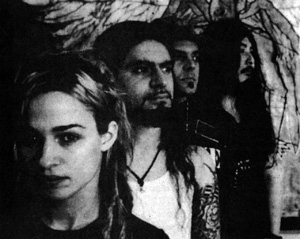 The last track, “Aftermath,” is a teaser of things to come?
The last track, “Aftermath,” is a teaser of things to come?
Yeah, maybe. We’re always experimenting, and whatever happens happens. We just let the music work through us and try not to dictate too much what’s going on. I made a set of chimes out of drill bits and screws, and recorded stuff on four-track. Not all of it was as atmospheric, or as ethereal, or ambient, but I was really into a lot of early Neubanten, and other German bands that are really hard to pronounce. They used organic things for instruments: scraps of metal, pieces of wood, that sort of thing. I was experimenting with textures. That song was four tracks that ended up being sixteen tracks long. Kind of a soundtrack for a performance.
You’ve got a strong background in classical music, too?
When I was young, I wanted to be a gypsy because my great-great grandfather was a gypsy. So I ended up playing violin and piano. Then I was surrounded by classical music and heard all the greats. When you’re a classical musician, teachers are always pounding classical music into your head. It just wasn’t enough for me, so I started branching out. I never got into pop music that much, and I kind of missed the whole punk thing. I didn’t really have many friends who were into stuff like that. My direction was more texture and abrasive sounds, and I found industrial music to be that way. I heard all the early dance industrial on Wax Trax!, but then I found bands like HNAS, from Germany, which means “the deer is on the sofa.” They were like early Neubanten, but they used more vocal samples. The songs were kind of like soundtracks. There weren’t really lyrics, per se; the vocals were used more as an instrument. That’s when I started getting into four-track music. I was always making little instruments at home, or fucking around on the violin, and that led to my singing.
The Neubanten influence really shows in the singing; it’s not so much a pleasing melody as pushing the extremes to which you can use a voice.
I couldn’t sing for shit. People used to make fun of me for trying to sing along with tapes I had. I was trying to teach myself, so I’d go in my room with my tapes. My sister thought I was trying to kill myself. In my mind I was stretching my voice. When I started, I wasn’t really singing lyrics like I am now. I was using my voice as an instrument, and it wasn’t really important what I was saying. The first Neubanten single I heard was “Burning Soul.” It’s really quiet, with a little bit of bass jingling in the back, a bit of drums, and then it goes dead silent. Then Blixa just screeches this high-pitched thing that ends up crackling. It was a whole different dimension of vocals for me. That expression was a real eye-opener. Playing with metal and hard, scratchy substances, like rust; the whole Neubanten concept of rebuilding from ashes totally struck me. I could completely relate to that in my life, and musically, that’s how my music was. I think Crisis has a lot of those elements.
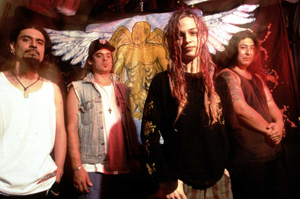 How did you hook up with the guys from Crisis?
How did you hook up with the guys from Crisis?
I heard a practice tape through an ex-roommate, and instantly some lyrics came into my head. I’d never written lyrics like that before and I’d never sung like that before. I’d experimented in textures, but never texturally with words – it changes the whole dynamic. So we got together at our photographer’s place and we brought stuff we were working on. We played tapes for each other, and they said they wanted me as a singer. They gave me a practice tape that I played when I got home at, like, one in the morning. The lyrics just popped into my head with the whole vocal style. I wasn’t even sure if I could sing that way because I’d never done it like that before. We met up the next day for a rehearsal, and I asked them to play that song first. I thought they might not like what I was doing, and if I was going to embarrass myself, I wanted to hurry up and get it over with. We played it, and it was great – it just came out naturally. It was like someone plugged us into a wall. I was hopping all over like I do live, and I ended up on the floor. From there we just kept going.
What was that first song?
“Drilling Me.” It’s towards the end of 8 Convulsions (Too Damn Hype). Three of the songs were from our first demo. Then we recorded five more songs that we released on the tape called 8 Convulsions. We were just going to use that as a demo, but people bought them so quickly that we had to make more of them. That ended up being the CD as well. This whole experience has been really interesting. We’re not a band that likes to imitate the bands we like, and we’re not going for a specific sound. We really try to stay humble about our music, because we really feel it comes from somewhere else. We just let the music work through us. There are times when I’m writing a vocal line that I hate, and I really don’t want to sing it. But I can’t change it because that’s what’s coming out. I learn to like it. It may sound New Age, but I really feel like a vehicle for it. It’s natural and primal, that’s why we like to play live a lot. That’s where the creation is, that’s where the energy is happening. What we’re doing may not be that cool, and it may be kind of weird for some people, but that’s what’s coming out. None of us have tried to stifle that, or change it in any way.
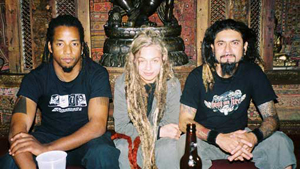 What about lyrical content? Frustration, and violence, and guys… You don’t seem to like guys too much. What is the lyrical inspiration?
What about lyrical content? Frustration, and violence, and guys… You don’t seem to like guys too much. What is the lyrical inspiration?
That’s really hard to answer. When I get ideas, I get them in images, not in words. When I was growing up I didn’t talk a lot, I painted. That was my means of self-expression. Visuals. With our songs, too, I get an image of something. It’s like a little comic book movie going through my head.
Do you have any lyrics you regret writing, or specific songs you’re really proud of?
I like them all, but for very different reasons. Some of them I wrote and didn’t think were cohesive, or I didn’t understand them; but the more I read them, they made sense. It’s another one of those things I don’t have a whole lot of control over. People ask me if I’m a man-hater, especially because of “Sweet Thing.” But a lot of people get into that song just because it’s about violation. It’s not me judging the world of men, it’s a conversation on the street between two people. One saying to the other, “Don’t talk to me that way, you can’t violate me or make me feel bad about who I am.” Obviously I’m not a man-hater, I’m in a band with three guys. Why would I want that, or why would they want that? One reason I hate doing interviews is that we’re not riding on that whole girlie-in-the-band thing. No matter how many of the band members are there, interviewers always ask me about feminism, focus on my clothes or how short I am… This isn’t a modeling session, it’s about the music. There are four people in this band, we’re all very different, and gender doesn’t really matter that much.
The dark images, they’re processed within, but what outside elements, specifically, helped create those images?
There are so many of them, I don’t really know what aspect of the question to answer. Growing up, even through high school, I didn’t really speak much. I liked to observe. I really got into psychology. I liked to watch the ways people interacted with each other. I went through a phase when I joined Amnesty International and was really into animal rights. I got away from that because I realized that by joining a club with an ideal as a common thing, you lose your identity and what you believe in. I traveled to a lot of countries to see what was there in terms of personal relations, and violence. From a political perspective, I went more into a personal perspective. I don’t really know, it’s hard to pinpoint one particular thing that I’ve seen externally that has affected me. I’ve seen a lot of violence, I’ve been in a lot of fights… And I’ve had a lot of health problems that bring on strange mental… thoughts. I have asthma. It’s under control now, but about a year back it was really bad. I’d wake up every two hours, on the hour, in the middle of an asthma attack so bad that I thought I was going to die. Things start going through your head. I’d have to crawl to the bathroom to try to get some hot water. My medicine wouldn’t work at that point until I’m drooling from every hole in my face. I’m just, like, gagging for air. What’ll happen is you’ll only have this little slit to breath out of. It took me about 45 minutes to slow my heart rate down. So you’re doing all these things, trying to control this body – this body that’s not working right. You’re mind goes through a lot of different things.
If you think in terms of visuals, are there any images that are stronger than others, or recurring themes?
All the songs deal with decayed emotional state, or paranoia, or pure rage. Everything is pretty dark. They’re kind of hard to explain, in general. They’re all a struggle. But they’re all completely different. That’s why I never tire of rehearsing the songs over and over, because they’re all completely different little worlds for me.

